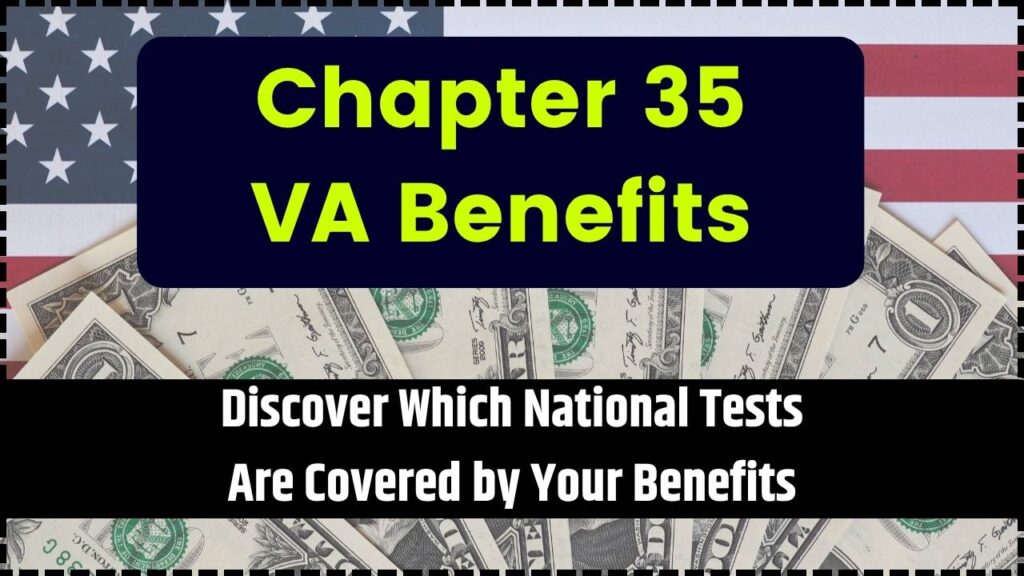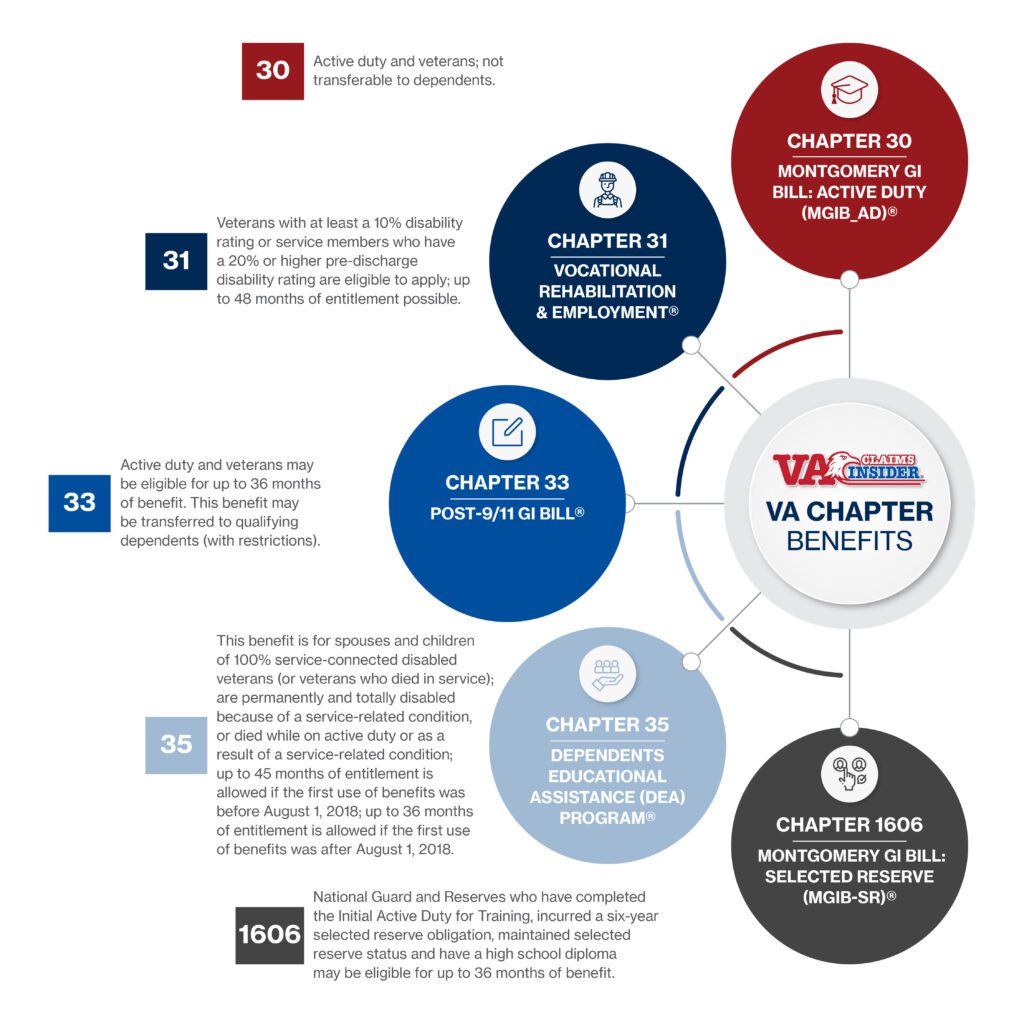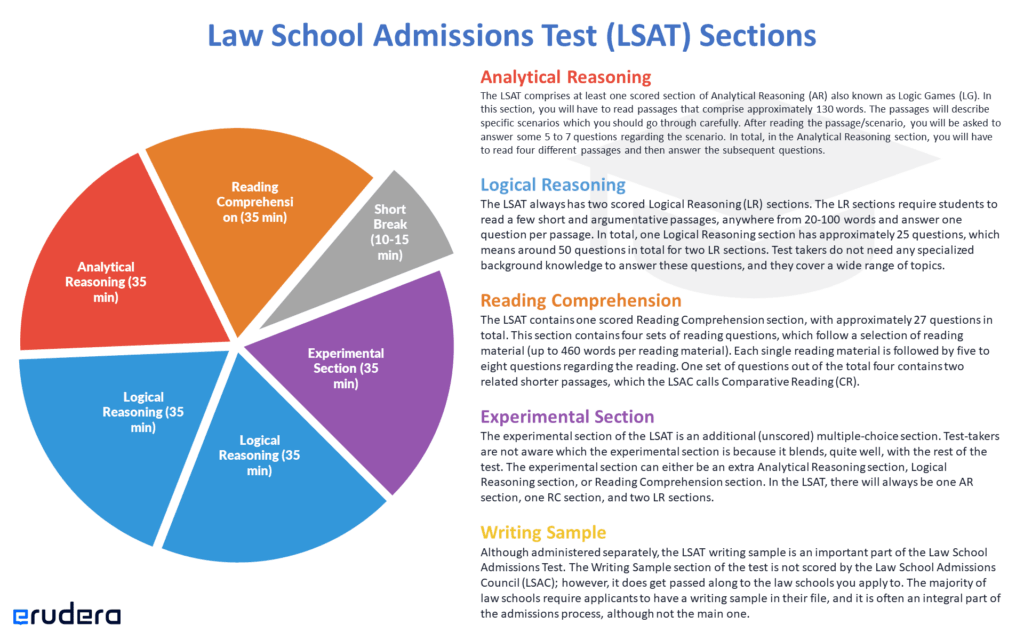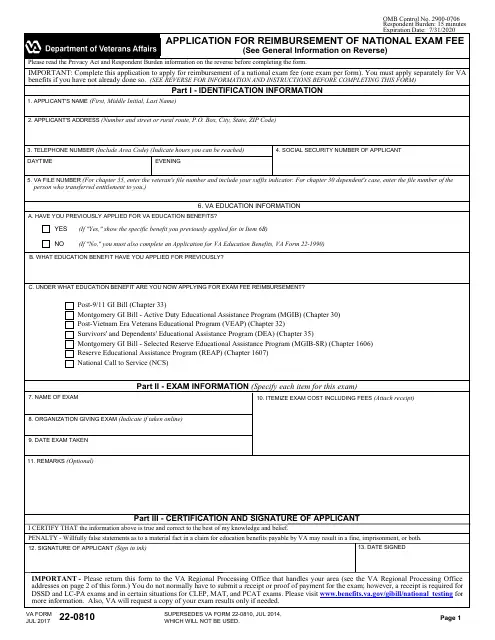Chapter 35 VA Benefits: The U.S. Department of Veterans Affairs (VA) offers a valuable benefit to eligible dependents and survivors of veterans through Chapter 35 VA benefits—also known as the Survivors’ and Dependents’ Educational Assistance (DEA) program. One of the lesser-known perks of this program is the ability to use these benefits to cover the cost of various national tests. But what exactly does that mean? How can you take advantage of this? Let’s break it down in an easy-to-understand way, while still offering useful advice for those of you looking for specifics. In this article, we’ll cover which national tests are covered by Chapter 35 VA benefits, how to apply for reimbursement, and why this could be an incredible opportunity to boost your education or career path—whether you’re heading to college, pursuing graduate school, or entering the workforce. We’ll also explore how to make the most of these benefits, how to navigate the application process efficiently, and provide real-world examples of how the program works.
Chapter 35 VA Benefits
Chapter 35 VA benefits are a fantastic resource for the families of veterans, providing financial support for education, training, and professional development. By covering the costs of national exams, these benefits offer an opportunity to save on test fees while moving forward in your academic or career journey. Whether you’re applying for college, advancing in your career, or aiming for graduate school, don’t miss out on this valuable perk. Follow the steps we’ve outlined to claim your benefits and get reimbursed for your exam fees—your future starts now!

| Key Information | Details |
|---|---|
| Covered Tests | SAT, ACT, GRE, GMAT, LSAT, CLEP, AP, and more. |
| Eligible Users | Dependents and survivors of veterans who qualify for Chapter 35 VA benefits. |
| Reimbursement Process | Submit Form 22-0810 to claim reimbursement for test fees. |
| Full Reimbursement | The VA covers the entire cost of approved tests, including administrative fees. |
| Example Tests | GRE (Graduate Record Examination), LSAT (Law School Admission Test), TOEFL (Test of English as a Foreign Language). |
| Official VA Resource | VA Education Benefits. |
What Are Chapter 35 VA Benefits?
Chapter 35 benefits are part of the Survivors’ and Dependents’ Educational Assistance (DEA) program, which helps the families of service members who have died or are permanently and totally disabled due to a service-related condition. This benefit is also available to the children and spouses of veterans who meet specific service and eligibility requirements.
The DEA program offers financial aid for education and training, including traditional college education, career training, and professional development. What many people don’t realize is that Chapter 35 benefits also cover national exams, providing financial support for a wide variety of standardized tests that are crucial for academic and professional advancement.
Who is Eligible for Chapter 35 VA Benefits?
Chapter 35 VA benefits are available to:
- Surviving spouses of veterans who passed away due to service-related injuries.
- Dependents (children) of veterans who are permanently and totally disabled due to a service-related condition.
- Spouses of veterans who are permanently and totally disabled due to a service-related condition.
Eligibility depends on the veteran’s service record and whether the veteran is currently active, disabled, or deceased due to service-related circumstances. Always check with the VA or use their online tools to confirm eligibility.

Which National Tests Are Covered by Chapter 35 VA Benefits?
If you’re planning to take a standardized exam for college admissions, earning college credits, or advancing your professional credentials, Chapter 35 benefits have you covered. Below, we’ve listed some of the most popular and commonly covered tests under this program.
1. College Admissions Tests
- SAT (Scholastic Assessment Test): A widely used college admissions test that measures students’ skills in reading, writing, and math.
- ACT (American College Testing): Another popular college admissions test, the ACT evaluates your readiness for college by testing subjects like English, Math, Reading, and Science.
- TOEFL (Test of English as a Foreign Language): For non-native English speakers, the TOEFL measures your English proficiency to determine if you’re ready for higher education in an English-speaking environment.
2. College Credit Exams
- AP (Advanced Placement) Exams: These tests allow students to earn college credits while still in high school. They’re typically given in subjects like Calculus, History, and Biology.
- CLEP (College-Level Examination Program): CLEP exams give students the opportunity to earn college credit for what they already know—whether it’s a subject they’ve studied in high school or learned through life experience.
- DSST (DANTES Subject Standardized Tests): Similar to CLEP, DSST exams allow students to earn credit by passing exams in various subjects.
- Excelsior College Exams (ECE): These exams are another way to earn college credit through testing, often in nursing and other health-related fields.
3. Graduate School Admissions Tests

- GRE (Graduate Record Examination): A standardized test required for admission to many graduate programs. It tests verbal reasoning, quantitative reasoning, and analytical writing.
- GMAT (Graduate Management Admission Test): A test often required for business school admissions, focusing on quantitative and verbal reasoning, integrated reasoning, and analytical writing.
- LSAT (Law School Admission Test): Required for law school admissions, the LSAT tests reading and verbal reasoning skills.
4. Professional Program Exams
- MCAT (Medical College Admission Test): A standardized test used by medical schools to evaluate prospective students’ knowledge in areas like biology, chemistry, and critical thinking.
- DAT (Dental Admission Test): This exam is used by dental schools to assess students applying for dental programs.
- PCAT (Pharmacy College Admission Test): Required by some pharmacy schools, the PCAT tests knowledge in biology, chemistry, and verbal reasoning.
5. Other Professional Certification Exams
- OAT (Optometry Admission Test): Required for students applying to optometry programs.
- MAT (Miller Analogies Test): A test measuring your analytical thinking and ability to understand relationships between concepts.
Real-World Example: How Chapter 35 Benefits Can Propel Your Education
Let’s say you’re a veteran’s child named Jamie, and you’re preparing to take the GRE for graduate school. You’re planning to attend a top university, but the exam fees are steep—around $205 for the general GRE, with additional charges for sending scores to universities. Thanks to Chapter 35 VA benefits, you won’t have to stress about these costs. Instead, you can focus on your preparation, knowing that your benefits will cover the cost of the test. Once you’ve taken the test and received your results, simply submit your claim for reimbursement.
The same goes for exams like the MCAT or LSAT—Chapter 35 allows you to pursue these opportunities without worrying about the upfront financial burden. You’ll also save time and money that could otherwise be used on preparation materials or other educational expenses.
How to Claim Chapter 35 VA Benefits for National Tests?
Now that you know which tests are covered, let’s talk about how you can actually claim reimbursement for the costs associated with these exams. The process is relatively simple, but you’ll need to follow a few steps to make sure you get the benefits you’re entitled to.
Step 1: Take the Test
The first step is to take the approved national test. Keep in mind that the test must be one of the eligible exams, as listed above.
Step 2: Gather Your Documents
After taking the test, keep all receipts and documentation related to your test fees. You’ll need these to apply for reimbursement. This includes:
- A copy of your test receipt showing the total amount paid.
- Proof that you took the test, such as your test results or score report.
Step 3: Complete VA Form 22-0810
To apply for reimbursement, you’ll need to complete VA Form 22-0810, which is the official form used to request reimbursement for national test fees.
Step 4: Submit Your Application
Once the form is completed and you’ve gathered all your documents, you can submit your application for reimbursement. There are two ways to do this:
- Online Submission: Use the VA QuickSubmit service to upload your form and supporting documents.
- Mail: Alternatively, you can mail the form and documents to your local VA regional processing office.
Step 5: Wait for Reimbursement
The VA will review your application and, if everything checks out, reimburse you for the cost of your national exam. Keep in mind that it may take a few weeks for the reimbursement to be processed, so be patient.

Veterans Alert: 2025 Pension Settlement Is Live—Claim Form & Amount Inside!
Veterans With 70% Disability and 2 Parents: Here’s Exactly How Much You’ll Get Monthly
Chapter 31 VA Benefits: Can You Still Qualify With a Less-Than-Honorable Discharge?











